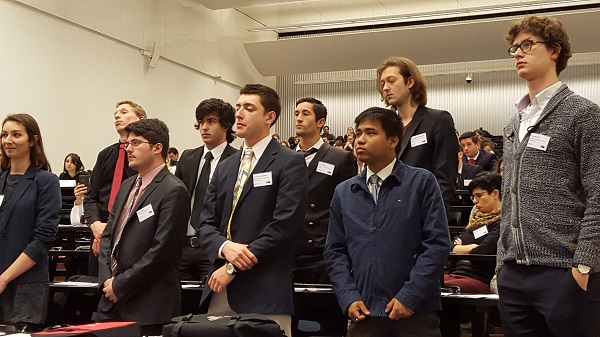
By Ronald Hanaki
Sports Editor
From Jan. 4 to Jan. 7, the University of Antwerp in Belgium welcomed nearly two hundred students from American and European universities for the 29th International European Union Session of EuroSim.
This year, political science professor Dr. Leif Johan Eliasson led five students from East Stroudsburg University to the annual four-day conference.
Although it is a political conference, EuroSim is open to all students from all majors.
For students, there are many benefits to participating in EuroSim, but it requires a serious commitment on the part of the student.
Dr. Eliasson said, “Students prepare at their home institution by reading up on and discussing the EU (European Union), law, policies, proposals, and negotiating strategies. They are assigned the role of a real policy maker, such as the head of government, a minister, or a member of the legislature, by the (European or American) faculty member writing the simulation program.”
“Thereafter, students extensively research their alter ego and their party’s or government’s policy position, before writing a position paper and drawing up a negotiating strategy and outlining tactical moves useful in multilateral negotiations,” explained Eliasson.
“Advanced degree programs and professional settings, including the military, government, and multinational corporations, recognize the utility of sophisticated and challenging simulations to enhance an individual’s understanding of particular issues and crises; to build preparedness and capability. So EuroSim is a valuable experience that can carry over into many fields,” said Eliasson.
The topic up for debate this year was political asylum and immigration.
Eliasson explained, “The EU had planned on reformatting its common asylum policy for a few years, but the immediacy of the refugee flow from Syria, Iraq and Afghanistan (as well as Libya, Ethiopia and a few Balkan states) meant the simulation topic took on an unexpected immediacy, with real life challenges of unprecedented scope.”
“The news that Sweden (which receives more refugees per capita than any other OECD country) reinstated border controls with Denmark for the first time since WWII in order to stem refugee flows became a major discussion point at the simulation, complicating attempts at an agreement,” said Eliasson.
Anthony Ruiz, a senior political science and philosophy double major, was one of the students who took part in EuroSim.
“This experience really opened my eyes to how complex the EU really is. It is not a bunch of countries doing their own thing. It is a collaboration of common countries debating on how to fix problems as a whole. However, a lot of countries have a lot of ideas, so it gets lengthy and problematic at times,” Ruiz explained.
“I think the best part was engaging with students from different parts of the world. No matter what school or country we came from, we focused on the same topic, and where we came from dissolved into the background while trying to achieve a common goal. It was also really cool to talk to them outside the conference about what is different about their schools and countries than ours,” said Ruiz.
Lillian Grainger, a junior political science major, also attended the event and spoke about her experiences.
“EuroSim was a great experience. It really threw me into policy-making and how that actually works. It put into perspective how other governments are run. To see and experience that outside of America was both exhilarating and overwhelming as I am not used to such a setting, but it really puts into perspective what I am learning in school.”
“I learned a lot. It was pretty fun. I had a good time. I would do it again,” enthused Grainger.
As for the topic itself, Grainger said, “There were a lot of opinions about asylum policy and how it is run and what should be changed. Everyone’s opinion is going into forming a policy. It put into perspective how hard it is to form a legislation, so you kind of get a gist of what politicians go through.”
“In the end, we came to the conclusion that what we had was the best thing for everyone. It was also cool to see how close we came to the real thing [the EU’s proposed Dublin IV Regulation],” said Grainger.
Anthony Honorowski, a senior economics major, said, “I thought the program was very well done and really gave students a good feel for what it would be like to be a public administrator in the EU.”
“After attending EuroSim, I am more intrigued than ever to learn more about the EU and the asylum crisis. I feel that after the experience, I have a far greater understanding of the complexity of the crisis,” stated Honorowski.
Elliot Louisos is a four-time EuroSim participant and future star on the international scene from perennial EuroSim powerhouse Canisius College in Buffalo, New York.
Louisos commented, “The first time we went, it [EuroSim] was in East Stroudsburg [in 2013]. I have worked on public speaking skills, drafting resolutions and debating. All of these skills are beneficial to any career a person enters, especially in politics and international relations.”
“Engaging with people was the best part of the EuroSim experience. Meeting people from all over the world (mostly EU countries and the U.S.) was great. Everyone is very friendly and open to meeting with and asking people about their country or their lives,” said Louisos.
Louisos continued, “I think the dialogue that occurs not just about EuroSim, but about real international conflicts and domestic politics really is quite enjoyable. Everyone has a common bond in EuroSim, but we all can just enjoy the city, nightlife and just be friends. There are so many friendships that have resulted because of EuroSim, and that to me is invaluable.”
Energy union is the topic for debate at next year’s EuroSim conference, which will be held at SUNY Brockport in March 2017. Students interested in participating should know that ESU participation is part of a credit-bearing course taught by Eliasson.
Email Ronald at:
rhanaki@live.esu.edu

